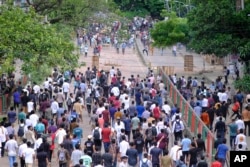Student Union
Tragedies Highlight Dark Side of Greek Life

Greek life communities on campuses across the U.S. are again facing a reckoning after recent student deaths due to alleged hazing.
Virginia Commonwealth University (VCU) freshman Adam Oakes died February 27, and Bowling Green State University (BGSU) sophomore Stone Foltz died March 7 after both consumed large amounts of alcohol at fraternity events.
Oakes was at an event at Delta Chi in Virginia, and Foltz was at an event at Pi Kappa Alpha in Ohio. In statements that expressed sympathy for the loss of Oakes and Foltz, the national organizations of Delta Chi and Pi Kappa Alpha announced that the chapters involved in the hazing allegations have been suspended.
"Regardless of if it's a fraternity or a sorority, it's absolutely despicable that these life-threatening actions are still carried out — often, with little to no accountability," Schanelle Saldanha, a junior at American University in Washington, told VOA.
"That, coupled with the accusations of racism and sexual assault, only reinforce why Greek life is such a toxic community for so many," she opined.
According to Inside Hazing, an anti-hazing website, while 65% of respondents in a survey of fraternity and sorority members said the primary goal of an initiation is to bond:
57% said it is important to tolerate psychological stress.
31% said humiliation is a significant element in an initiation.
29% said extreme consumption of alcohol is often part of an initiation.
29% said it is important to tolerate physical pain.
29% said they are concerned with the overuse of alcohol during pledge activities.
25% said paddles are usually used during initiation.
Not all the 12,000 chapters of 123 fraternities and sororities on U.S. campuses experience extreme violence or mayhem. Many of the 750,000 undergraduate members on the more than 800 campuses in the U.S. and Canada said they enjoyed being part of a community and gaining leadership skills.
Living in a house with other members offers support, socialization and even proximity to campus, students at Missouri State University told the student-run newspaper The Standard in 2018.
But, according to the Addiction Center website, while most agree that heavy drinking and partying is a big part of Greek life, driving pledges into harmful behavior is not.
"While the circumstances surrounding these deaths are still under investigation, we must be clear that hazing is a betrayal of the fraternal vows to which every member commits and has no place on campus. When hard alcohol is added to the mix, it is a formula for tragedy," the North American Interfraternity Conference (NIC) wrote in a statement to VOA.
Regrets and apologies have followed injuries and death at fraternity initiations since 1959, said Hank Nuwer, a professor emeritus at Franklin College and author of Hazing: Destroying Young Lives.
But each year, young men pledging for admission to a fraternal organization turn up dead or gravely injured. They have been poisoned by excessive alcohol and have choked on their own vomit, like Max Gruver, who died at the Phi Delta Theta house at Louisiana State University in Baton Rouge in 2017.
They have fallen down stairs and sustained traumatic brain injuries, like Tim Piazza, who died in 2017 at Beta Theta Pi at Penn State University. They have been found dead at the bottom of a gorge, like Cornell University freshman Antonio Tsialas, whose death was ruled an accident after he left a Phi Kappa Psi fraternity house in 2019.
"The goal is for something like this to never happen again and to build a national model that promotes health and safety and creates a climate of respect and inclusion that is conducive to academic success," wrote VCU President Michael Rao in the university's plan for a review of Greek life. He did not mention Delta Chi specifically in this statement.
BGSU has suspended Pi Kappa Alpha for alleged hazing and is working with law enforcement and pursuing its own code of conduct investigation, according to a message sent from BGSU President Rodney Rogers and Provost Joe Whitehead Jr. In addition, the university is halting new member initiations and all other events.
Before the pandemic, the Anti-Hazing Coalition — composed of parents of hazing victims — spoke at universities to educate students about bullying, forced excessive drinking and other potentially dangerous behaviors.
"They tell the stories of what actually happened to their sons, and the heinous behaviors of hazing that emerged on the campuses where their sons were attending college," said Dani Weatherford, CEO of the National Panhellenic Conference (NPC), which, with NIC, is part of the coalition.
And they "try to educate those students on the campuses where they're visiting, about what hazing looks like, how it can get out of control, and to urge them to make sure that these kinds of behaviors are not happening in their organizations and on their campuses," Weatherford said.
In a Zoom event on March 21, parent Rae Ann Gruver described how much her son, Max, drank at the fraternity, explaining that he took 18-20 "pulls" — or swigs — of a 190-proof grain alcohol called Diesel.
She said that the fraternity brothers made Max drink when he answered questions wrong, and that because he had been late to fraternity events, he was made to drink even more.
"They singled him out," she said. "The actions taken by these hazers resulted in my son's death."
Rae Ann Gruver and her husband, Stephen Gruver, have also worked to pass new hazing laws in Louisiana and founded the Max Gruver Foundation. Weatherford said NPC and NIC are also taking action at the legislative level.
While criminal accountability in hazing is under state jurisdiction, federal legislation addresses it through the END ALL Hazing Act and the Report and Educate About Campus Hazing (REACH) Act, Weatherford said.
The END ALL Hazing Act focuses on campus transparency and would require that universities post online any adjudications — formal judgments — of hazing incidents. The REACH Act aims to establish a federal definition of hazing and requires that hazing be a Clery Act crime, meaning that universities would have to include hazing in their crime statistics.
Weatherford recommends that hazing victims, at the least, report the acts to the university, but how things are handled and what resources are offered could differ according to the campus.
As for prospective students who are interested in Greek life but worried about the possibility of hazing, Weatherford advises them to be aware and know that both NPC and NIC — and the fraternities and sororities that fall under them — are anti-hazing organizations.
"We want to make sure that if there are bad actors, that those bad actors are held accountable and removed from our organizations," Weatherford said.
See all News Updates of the Day
Tips for first-year international students in the US
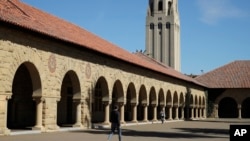
Book your flights right away, get a U.S. phone plan, make sure you have linens for your dorm and attend orientation – that’s some of the advice international students have for first-year college students coming from abroad.
U.S. News & World Report compiled helpful tips for students studying in the United States for the first time. (July 2024)
Survey: Social integration, career prep are important to international students
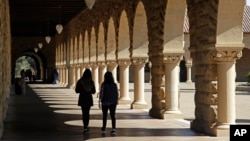
A recent survey of international students in the United States found that before starting school, they were concerned about personal safety, making friends and feeling homesick.
Inside Higher Ed reports that international students want specialized orientations, peer connections, career preparation and job placement to help make their college experiences successful. (July 2024)
US advisory council ends Nigeria visit, signs student exchange deal

Members of a U.S. presidential advisory council have approved a student exchange deal between an American college and a Nigerian university as part of the council's effort to strengthen collaboration on education, health, entrepreneurship and development between Africa and Africans living abroad.
The council also visited a health facility supported by the United States Agency for International Development in the capital.
Nigerian authorities and visitors chatted with members of the U.S President's Advisory Council on African Diaspora Engagement as they toured a healthcare facility in Karu, a suburb of Abuja, on the last day of the council's three-day visit to Abuja and Lagos.
The facility is one of many supported by the United States Agency for International Development, or USAID, to improve the management of childhood illnesses, family planning, immunization and delivery.
The tour was part of the council's effort to promote African diaspora-led investments in technology entrepreneurship, education and healthcare delivery.
"They're doing a phenomenal job there, it really gave us a sense of what the healthcare system is in Nigeria," said Deniece Laurent-Mantey, executive director of the advisory council. "This is our first trip as a council to the continent and we chose Nigeria for a reason — the diaspora in Nigeria is very active, very influential, and they're really a source of strength when it comes to our U.S.-Africa policy. And so for us coming to Nigeria was very intentional."
The council was created by President Joe Biden in September to improve collaboration between Africa and its diaspora in terms of economic and social development.
Akila Udoji, manager of the Primary Healthcare Centre of Karu, said officials in Nigeria were pleased that the council members were able to visit.
"We're happy that they have seen what the money they have given to us to work with has been used to do, because they have been able to assist us in capacity-building, trainings, equipment supply and the makeover of the facility," Udoji said.
Earlier, the council signed a deal for a student exchange program between Spelman College in the southern U.S. city of Atlanta and Nigeria's University of Lagos.
Laurent-Mantey said education exchanges are one of the council's top priorities.
"In Lagos, we had the president of Spelman College — she's also a member of our council — she signed an agreement with the University of Lagos to further education exchange programs in STEM and creative industries between those two universities," Laurent-Mantey said. "And I think for us it's very important, because Spelman College is a historically Black university, and so here we are promoting the importance of collaboration between African Americans and Africans."
In March, the advisory council adopted its first set of recommendations for the U.S. president, including the student exchange initiative, advocating for more U.S. government support for Africa, climate-focused initiatives, and improving U.S. visa access for Africans.
The council met with Nigerian health and foreign affairs officials during the visit before leaving the country on Wednesday.
American Academy of the Arts College announces closure
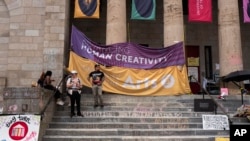
The American Academy of Art College in Chicago announced it would be closing after 101 years of preparing students for careers in art and illustration.
WTTW news reported that like other art colleges, the academy saw enrollment drop after the pandemic, and officials made the decision to close the college last month. (July 2024)
5 killed, dozens injured in clashes over Bangladesh jobs quota system
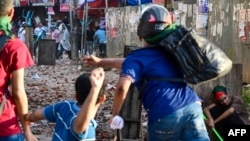
At least 5 people were killed and dozens injured in two separate incidents in Bangladesh as violence continued Tuesday on university campuses in the nation's capital and elsewhere over a government jobs quota system, local media reports said quoting officials.
At least three of the dead were students and one was a pedestrian, the media reports said. Another man who died in Dhaka remained unidentified.
The deaths were reported Tuesday after overnight violence at a public university near Bangladesh's capital, Dhaka. The violence involved members of a pro-government student body and other students, when police fired tear gas and charged the protesters with batons during the clashes, which spread at Jahangir Nagar University in Savar, outside Dhaka, according to students and authorities.
Protesters have been demanding an end to a quota reserved for family members of veterans who fought in Bangladesh's war of independence in 1971, which allows them to take up 30% of governmental jobs.
They argue that quota appointments are discriminatory and should be merit-based. Some said the current system benefits groups supporting Prime Minister Sheikh Hasina. Some Cabinet ministers criticized the protesters, saying they played on students' emotions.
The Bengali-language Prothom Alo daily newspaper reported that one person died in Dhaka and three others, including a pedestrian, were killed after they suffered injuries during violence in Chattogram, a southeastern district, on Tuesday.
Prothom Alo and other media reports also said that a 22-year-old protester died in the northern district of Rangpur.
Details of the casualties could not be confirmed immediately.
While job opportunities have expanded in Bangladesh's private sector, many find government jobs stable and lucrative. Each year, some 3,000 such jobs open up to nearly 400,000 graduates.
Hasina said Tuesday that war veterans — commonly known as "freedom fighters" — should receive the highest respect for their sacrifice in 1971 regardless of their current political ideologies.
"Abandoning the dream of their own life, leaving behind their families, parents and everything, they joined the war with whatever they had," she said during an event at her office in Dhaka.
Protesters gathered in front of the university's official residence of the vice chancellor early Tuesday when violence broke out. Demonstrators accused the Bangladesh Chhatra League, a student wing of Hasina's ruling Awami League party, of attacking their "peaceful protests." According to local media reports, police and the ruling party-backed student wing attacked the protesters.
But Abdullahil Kafi, a senior police official, told the country's leading English-language newspaper Daily Star that they fired tear gas and "blank rounds" as protesters attacked the police. He said up to 15 police officers were injured.
More than 50 people were treated at Enam Medical College Hospital near Jahangir Nagar University as the violence continued for hours, said Ali Bin Solaiman, a medical officer of the hospital. He said at least 30 of them suffered pellet wounds.
On Monday, violence also spread at Dhaka University, the country's leading public university, as clashes gripped the campus in the capital. More than 100 students were injured in the clashes, police said.
On Tuesday, protesters blocked railways and some highways across the country, and in Dhaka, they halted traffic in many areas as they vowed to continue demonstrating until the demands were met.
Local media said police forces were spread across the capital to safeguard the peace.
Swapon, a protester and student at Dhaka University who gave only his first name, said they want the "rational reformation of the quota scheme." He said that after studying for six years, if he can't find a job, "it will cause me and my family to suffer."
Protesters say they are apolitical, but leaders of the ruling parties accused the opposition of using the demonstrations for political gains.
A ruling party-backed student activist, who refused to give his name, told The Associated Press that the protesters with the help of "goons" of the opposition's Bangladesh Nationalist Party and Jamaat-e-Islami party vandalized their rooms at the student dormitories near the Curzon Hall of Dhaka University.
The family-of-the-veterans quota system was halted following a court order after mass student protests in 2018. But last month, Bangladesh's High Court nulled the decision to reinstate the system once more, angering scores of students and triggering protests.
Last week, the Supreme Court suspended the High Court's order for four weeks and the chief justice asked protesting students to return to their classes, saying the court would issue a decision in four weeks.
However, the protests have continued daily, halting traffic in Dhaka.
The quota system also reserves government jobs for women, disabled people and ethnic minority groups, but students have protested against only the veterans system.
Hasina maintained power in an election in January that was again boycotted by the country's main opposition party and its allies due to Hasina's refusal to step down and hand over power to a caretaker government to oversee the election.
Her party favors keeping the quota for the families of the 1971 war heroes after her Awami League party, under the leadership of her father, Sheikh Mujibur Rahman, led the independence war with the help of India. Rahman was assassinated along with most of his family members in a military coup in 1975.




